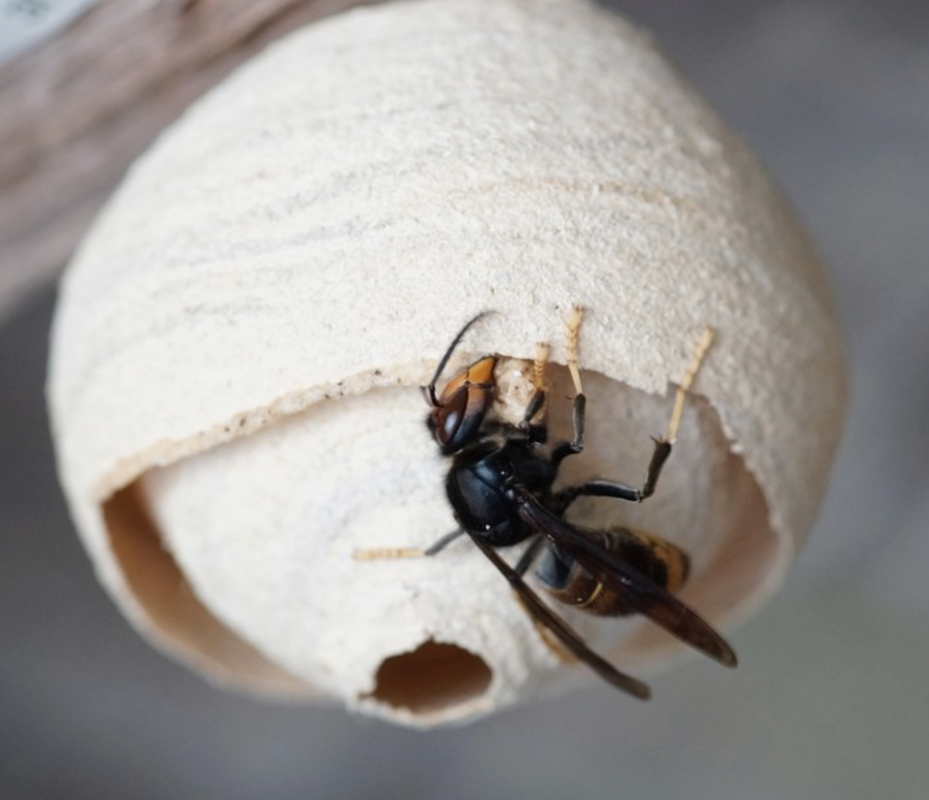|
As 2019 begins, our minds turn to the forthcoming beekeeping season, writes SBKA Asian Hornet Action Team Co-ordinator Lynne Ingram MB in the January issue of the newsletter.
At the moment we may be giving fondant to our bees, doing mid winter varroa treatments or perhaps planning our beekeeping goals for the year ahead. But, whatever else you are doing, you do need to be thinking about Asian Hornets. Last year there were four nests found and destroyed in the UK, and nine confirmed sightings. As the numbers build up in Europe, and Northern France, the threat of Asian Hornets invading the UK increases, and we all need to be very vigilant in order to prevent/slow a major invasion. Asian hornets (Vespa velutina nigrithroax) are voracious predators of pollinators, and in particular honeybees, whose colonies contain a vast number of insects in one place – a veritable insect supermarket for the Asian Hornet! So what are Asian Hornets doing this time of year? Mated queens are now overwintering in cracks, crevices and sometimes underground. They can hibernate singly or in small groups. We don’t know as yet, if there are any hibernating in the UK. Like bees they feed well in the Autumn, in order to build up their fat bodies to sustain them during the long winter. Like other members of the wasp family, they overwinter with their wings, legs and antennae protectively tucked in underneath them. The rest of the colony would have died out in December. As the days lengthen in March or April (depending on the weather), the queens start to come out of hibernation, and firstly search for nectar rich flowers, in order to build up their energy. In France and Jersey they are often seen on early Camellia flowers, so if you have any, it may be worth keeping an eye out for Asian Hornet queens. Queens search for a nest site, then start creating golf ball sized embryo nests, which are generally in sheltered spots such as sheds or garages. To start with the queen will be laying the eggs, foraging for food and feeding the larvae. She may curl herself around the pedicel of the nest to keep the larvae warm. Once the first workers emerge, they will take over many of these tasks, leaving the queen to lay eggs. If you see a nest, check for Asian hornet activity, then photograph it before reporting it. This is the time of year when a monitoring trap can be invaluable, attracting the queens to a sugar rich bait. It is important though that beneficial insects, such as European hornets and wasp queens, can be released from these traps in order to protect our native pollinators. You can make a trap from a water bottle as illustrated below (instructions on Beebase) www.nationalbeeunit.com/downloadDocument.cfm?id=1056 or buy a commercially available trap, and instead of filling the bottom with liquid bait in which insects would drown, scrunch up some kitchen towel so that insects can suck the bait from the paper without drowning. Or place a yogurt pot full of bait inside the trap, with a mesh or net covering to prevent drowning. Don’t forget to inspect your traps regularly, and release anything else that has been captured. If you find an Asian Hornet If you do find an Asian hornet in your trap, the key is to get evidence so that you can report it. You could take a photo through the trap wall, or put the trap in a bag in the freezer, and then photograph the hornet once it is dead. Email your photo with details to: [email protected] or use the Asian Hornet Watch app. Somerset Asian Hornet Action team If you think you may have seen an Asian Hornet and are struggling to get evidence, or need some advice then contact the Somerset Action team on: [email protected] and someone will come and help with identification and getting evidence. Comments are closed.
|
Archives
March 2024
Categories
All
|
Somerset Beekeepers Association Charity © 2021 Registered CIO Charity 1206483
Affiliated to the British Beekeepers Association
Click here to view our Privacy Policy
Affiliated to the British Beekeepers Association
Click here to view our Privacy Policy

 RSS Feed
RSS Feed
